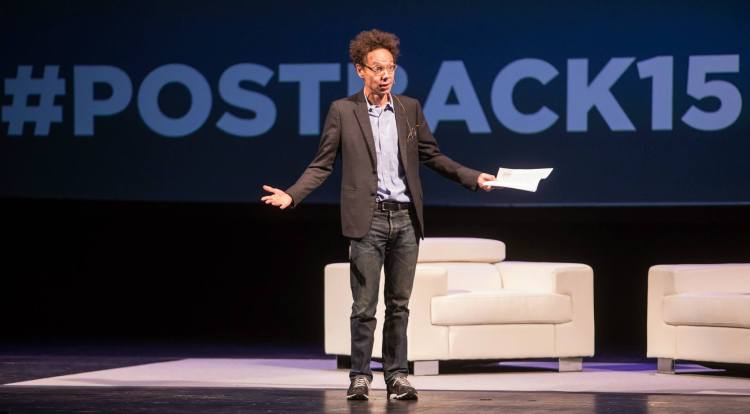Last night futurist, journalist, prognosticator, and author Malcolm Gladwell told pretty much the most data-driven marketing technologist crowd imaginable that data is not their salvation.
In fact, it could be their curse.
“More data increases our confidence, not our accuracy,” he said at mobile marketing analytics provider Tune’s Postback 2015 event in Seattle. “I want to puncture marketers’ confidence and show you where data can’t help us.”
The Snapchat problem
The average person under 25 is texting more each day than the average person over 55 texts each year, Gladwell says. That’s what the data can tell us.
What it can’t tell us is why.
“The data can’t tell us the nature of the behavior,” Gladwell said. “Maybe it’s developmental … or maybe it’s generational.”
Developmental change, in Gladwell’s story, is behavior that occurs as people age. For instance, “murder is a young man’s game,” he said, with almost all murders being committed by men under the age of 25. Likewise, dying in a car accident is something that just “statistically doesn’t happen” over the age of 40. In other words, people age out of developmental changes — they are not true long-term lasting shifts in behavior.
Generational change, on the other hand, is different. That’s behavior that belongs to a generation, a cohort that grows up and continues the behavior. For example, Gladwell said, baby boomers transformed “every job in America” in the ’70s as they demanded more freedom, greater rewards, and changes in the boss-employee relationship.
The question is whether Snapchat-style behavior is developmental or behavioral.
“In the answer to that question is the answer to whether Snapchat will be around in 10 years,” Gladwell said.
The Facebook problem
Facebook is massive, amazing, and almost literally incredible: a social network connecting over a billion people. That’s what the data can tell us.
What it can’t tell us is what it will become — what its full upside potential could be.
 “Facebook is at the stage that the telephone was at when they thought the phone was not for gossiping — it’s in its infancy,” Gladwell said, referencing that the early telephone marketers thought the phone was only for business. “We need to be cautious when making conclusions … we can see some things now, but we have no idea where it’s going.”
“Facebook is at the stage that the telephone was at when they thought the phone was not for gossiping — it’s in its infancy,” Gladwell said, referencing that the early telephone marketers thought the phone was only for business. “We need to be cautious when making conclusions … we can see some things now, but we have no idea where it’s going.”
Why?
The diffusion of new technologies always takes longer than we would assume, Gladwell said. The first telephone exchange was launched in 1878, but only took off in the 1920s. The VCR was created in the 1960s in England, but didn’t reach its tipping point until the 1980s — over and above the vociferous opposition of the TV and movie industry, which was convinced it would destroy their business.
And that’s for technologies that are just innovative.
Technologies that are both innovative and complicated, like Facebook, take even longer to really emerge.
“Any kind of new and dramatic innovation takes a long time to spread and be understood,” Gladwell said. “If we look at history, it tells us that the Facebook of today looks almost nothing like what it will tomorrow.”
The Airbnb problem
The sharing economy, featuring companies like Airbnb, Uber/Lyft, even eBay, rely on trust. And they’re growing and expanding like wildfire.
And yet, if you look at recent polls of trust and trustworthiness, people’s — and especially millennials — trust is at an all-time low. Out of ten American “institutions,” including church, Congress, the presidency, and others, millennials only trust two: the military and science.
 That’s conflicting data. And what the data can’t tell us is how both can be true, Gladwell said.
That’s conflicting data. And what the data can’t tell us is how both can be true, Gladwell said.
“Data can tell us about the immediate environment of people’s attitudes, but not much about the environment in which they were formed,” he said. “So which is right? Do people not trust others, as the polls say … or are they lying to the surveys?”
The context helps, Gladwell said.
That context is a massive shift in American society over the past few decades: a huge reduction in violent crime. For example, New York City had over 2,000 murders in 1990. Last year it was 300. In the same time frame, the overall violent crime index has gone down from 2,500 per 100,000 people to 500.
“That means that there is an entire generation of people growing up today not just with Internet and mobile phones … but also growing up who have never known on a personal, visceral level what crime is,” Gladwell said.
Baby boomers, who had very personal experiences of crime, were given powerful evidence that they should not trust. The following generations are reverting to what psychologists call “default truth.” In other words, they assume that when someone says something, it’s true … until they see evidence to the contrary.
“I think millennials are very trusting,” Gladwell said. “And when they say they’re not … they’re bullshitting.”
Whether that’s true or not, however, is extremely important to the future of the sharing economy.
Why marketers have a job
The deficiencies not only in data but of data are the reason marketers have a job, Gladwell said. In fact, it goes deeper than that:
“The reason your profession is a profession and not a job is that your role is to find the truth in the data.”
And that’s a significant challenge.
VentureBeat's mission is to be a digital town square for technical decision-makers to gain knowledge about transformative enterprise technology and transact. Learn More


